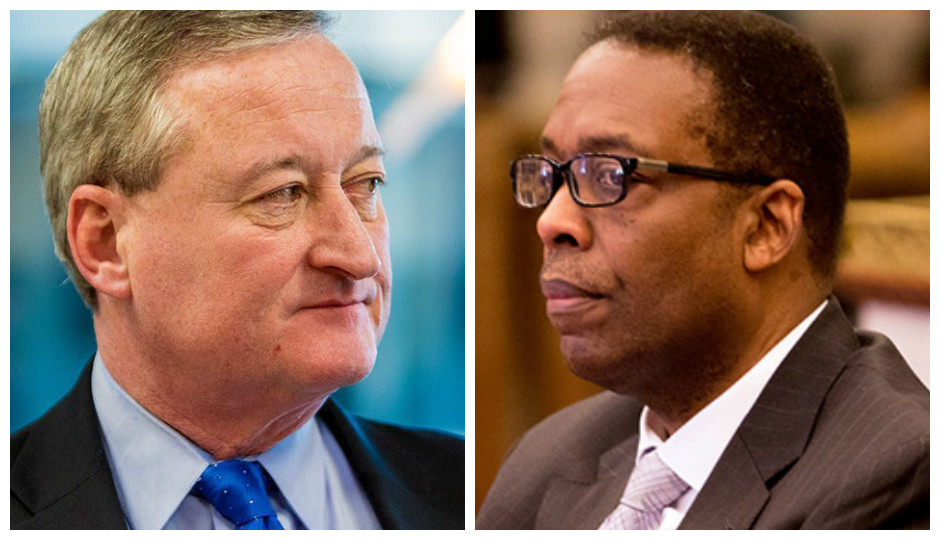Clarke Calls 3-Cent Soda Tax “Divisive,” Says It Won’t Pass

Photos by Jeff Fusco
Some City Council members argue that a 15-cent tax on beverage containers is more fair than a three-cent-per-ounce tax on sugary drinks because it would affect a broad swath of consumers rather than targeting low-income communities, who tend to drink the most soda.
But it would be harder to avoid, the Kenney administration says, which would ultimately make it more regressive, while doing away with any possible public health benefits a soda tax might generate. Plus, the container tax wouldn’t raise enough money to fund the expansion of pre-K classes, the creation of community schools, and the rebuilding of parks and rec centers that Mayor Jim Kenney has made the priority of his first year in office. At least not at the rate he wants to fund them.
City Council and the Kenney administration have just a few weeks to sort this out before their drop-dead deadline to pass a budget. At a hearing on Wednesday, Council President Darrell Clarke made his stance surprisingly clear: “Everyone on this side of the table knows that there’s not going to be a 3-cents-an-ounce tax,” he told Kenney’s finance director, Rob Dubow.
He said the soda tax proposal was the “most divisive” proposal he’d seen in his years at Council, despite the fact that nearly every Council member has publicly stated support for the initiatives the mayor is hoping to fund. The administration needs to give some serious thought to a “broader-based tax” than one that primarily impacts poor people, Clarke said, even if it doesn’t happen this year. He said he’d like to have a “little sit-down” with the administration before the next committee hearing on the operating budget, which is scheduled for June 8th.
It was fairly clear from questions raised during Wednesday’s hearings that Clarke favors the container tax over the soda tax, along with Council members Bill Greenlee, Maria Quiñones-Sánchez and Blondell Reynolds Brown. (Brown introduced the alternative proposal.) But it’s unclear whether either proposal has enough support on Council to pass, and it’s possible that some container tax advocates might vote for a version of the soda tax.
Meanwhile, Majority Leader Bobby Henon signaled that he supports the proposed soda tax, though he hasn’t publicly stated his stance in so many words. On Wednesday, he asked questions like, “Which proposal taxes more products in the grocery store?” and suggested that a container tax would put small bodegas and corner stores at a disadvantage relative to chains like Wawa, because Wawa could sell untaxed fountain sodas, while corner stores only stock contained beverages. (Yes, contained beverages. Articles about municipal budgets sometimes require phrases like that.)
Councilman Allan Domb argued that the soda tax would be most effective at a rate of 1.5 cents-per-ounce, in the sense that the per-penny returns diminish above that rate, according to Council’s estimates. Councilwoman Helen Gym said that maybe the per-penny returns get smaller, but cutting it down to 1.5 cents would reduce the total money raised by the tax by about $20 million. That’s around 2,300 fewer kids in pre-K, she said.
Several Council members stressed that pre-K services should be limited by income, so that children in poor families are served first. The pre-K program could be capped at 300 percent of the poverty rate, some suggested. Clarke, who earns $162,374 a year, or roughly 1,400 percent of the poverty rate, agrees with that suggestion.
“I’m too old for this now, but if I have a kid in pre-K, I don’t think the taxpayers should pay for that,” he said. “I should pay for that.”
So maybe a little sit-down is in order. Council currently has its last committee hearing scheduled for June 8th. If it approves a proposal that day, the full Council could adopt a budget by June 16th, which is its last scheduled session before the summer recess. If not, it may need to schedule another session in order to adopt a budget.
Follow @JaredBrey on Twitter.